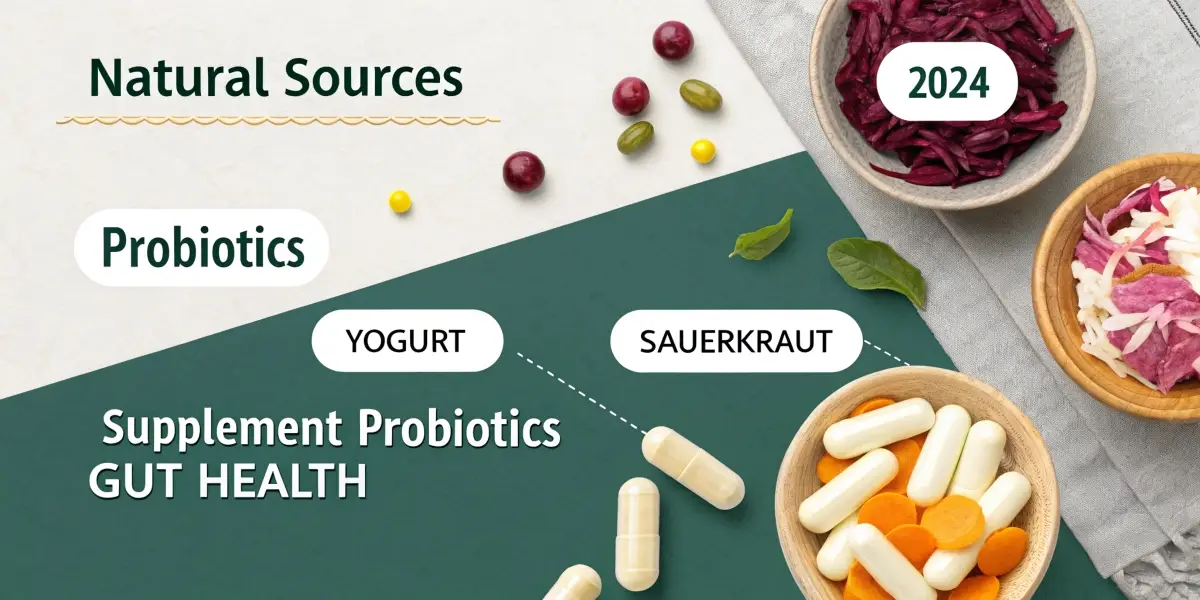When it comes to improving gut health, probiotics are a hot topic! But did you know that not all probiotics are created equal? Some come naturally from foods like yogurt and kimchi, while others are available in supplement form. Choosing between natural and supplement probiotics can feel overwhelming, especially when both options claim to support digestion and immunity. In this guide, we’ll break down the key differences, benefits, and drawbacks of each to help you decide which is the right choice for your health journey. Spoiler alert: there’s no one-size-fits-all answer, but we’ll help you make an informed decision!
Discover top-rated probiotic supplements that suit your lifestyle and health goals.
Contents
- 1 1. Natural Probiotics: What Are They?
- 2 2. Probiotic Supplements: What You Need to Know
- 3 3. Digestive Tolerance: Finding What Works for You
- 4 4. Cost and Accessibility: Planning Smartly
- 5 5. Targeted Health Benefits: General vs. Specific Needs
- 6 6. Sustainability and Lifestyle: Consistency and Convenience
- 7 Key Takeaways
- 8 7. Potential Risks and Side Effects: Safety Considerations
- 9 8. Cost and Accessibility: Affordability and Convenience
1. Natural Probiotics: What Are They?
Natural probiotics come from fermented foods and drinks that contain live microorganisms beneficial for gut health. These include:
- Examples of Natural Probiotics:
- Yogurt
- Kefir
- Kimchi
- Sauerkraut
- Miso
- Tempeh
- Pickles (fermented naturally, not vinegar-based)
- Kombucha
- How They Work:
Natural probiotics are formed during the fermentation process, where bacteria and yeast break down sugars and starches, creating live cultures that are consumed alongside the food. - Benefits of Natural Probiotics:
- They often come with additional nutrients such as vitamins, minerals, and enzymes.
- Affordable and widely available in everyday grocery stores.
- No additives or fillers compared to supplements.
- Limitations of Natural Probiotics:
- Strain diversity may be limited depending on the food source.
- May not provide high CFU (Colony-Forming Unit) counts for targeted health benefits.
- Some people might dislike the taste or texture of fermented foods.

2. Probiotic Supplements: What You Need to Know
Probiotic supplements are manufactured products designed to deliver beneficial bacteria in concentrated forms. These are available as capsules, powders, tablets, or liquids.
- Features of Probiotic Supplements:
- Contain specific strains (e.g., Lactobacillus acidophilus, Bifidobacterium bifidum).
- High CFU counts tailored for targeted needs like digestive health, immunity, or antibiotic recovery.
- Often combined with prebiotics (synbiotics) for enhanced efficacy.
- Benefits of Probiotic Supplements:
- Convenience: Easy to consume, especially for those with busy lifestyles.
- Consistency: Provides measurable and reliable doses.
- Targeted Strains: Can address specific gut issues such as IBS, diarrhea, or bloating.
- Limitations of Probiotic Supplements:
- Cost: Generally more expensive than natural food sources.
- Quality Concerns: Not all supplements are created equal; some may lack viable strains by the time of consumption.
- Side Effects: High doses or unsuitable strains may cause mild digestive upset.
3. Digestive Tolerance: Finding What Works for You
- Natural Probiotics:
- Contain live bacteria within a natural food matrix, making them gentler on digestion for many people.
- Foods like yogurt and kefir often include enzymes that aid in digestion, reducing the risk of bloating or discomfort.
- Supplements:
- Provide a concentrated dose of specific strains, which might overwhelm sensitive systems initially.
- To minimize potential side effects like bloating or gas, start with a low dose and gradually increase intake.
How to Combine:
- Begin with natural probiotics to introduce bacteria slowly to your system.
- Use supplements for targeted support when dealing with conditions like antibiotic recovery or acute gut imbalances.
4. Cost and Accessibility: Planning Smartly
- Natural Probiotics:
- Cost-effective for everyday use, as items like yogurt, sauerkraut, and miso are budget-friendly staples.
- Availability depends on regional accessibility to fresh, high-quality fermented foods.
- Supplements:
- Tend to be pricier due to advanced production processes and packaging. However, they are easily found in health stores or online.
- Cost per dose may be justified for conditions requiring specific strains or high CFU counts.
How to Combine:
- Use natural probiotics for everyday maintenance to keep expenses low.
- Invest in high-quality supplements during periods of heightened need, like illness or travel.
5. Targeted Health Benefits: General vs. Specific Needs
- Natural Probiotics:
- Promote general gut health by offering a broad spectrum of bacteria naturally found in foods like kimchi or kefir.
- Support immune health and nutrient absorption through consistent dietary inclusion.
- Supplements:
- Provide specific strains for targeted conditions, such as:
- Lactobacillus rhamnosus: Supports skin conditions like eczema.
- Bifidobacterium longum: May alleviate irritable bowel syndrome (IBS).
- Enable high-dose delivery of specific strains during acute health issues like diarrhea or antibiotic recovery.
- Provide specific strains for targeted conditions, such as:
How to Combine:
- Maintain natural probiotics daily for broad-spectrum support.
- Use supplements during specific health concerns or under a healthcare provider’s guidance.
6. Sustainability and Lifestyle: Consistency and Convenience
- Natural Probiotics:
- Fit seamlessly into meals for those who enjoy cooking or consuming fresh, whole foods.
- Provide a sustainable option for people who prioritize environmentally friendly, minimally processed choices.
- Supplements:
- Offer convenience for busy lifestyles or when traveling, where access to fresh fermented foods may be limited.
- Extended shelf life ensures long-term availability without refrigeration, unlike most natural options.
How to Combine:
- Rely on natural probiotics at home for regular meals and snacks.
- Use supplements for ease and consistency when traveling or during hectic periods.
Key Takeaways
- Natural probiotics provide broad-spectrum, sustainable support for everyday health.
- Supplements ensure targeted and convenient probiotic intake for specific needs or during lifestyle disruptions.
By integrating both, you can enjoy the best of both worlds, tailoring your probiotic intake to your health goals and lifestyle.
7. Potential Risks and Side Effects: Safety Considerations
- Natural Probiotics:
- Generally safe for most people, especially when sourced from trusted foods like yogurt, sauerkraut, or miso.
- Minor digestive upset (e.g., bloating or gas) can occur, particularly when starting a new probiotic-rich food.
- Risk of food allergies (e.g., dairy-based probiotics) or contamination in poorly prepared or stored products.
- Supplements:
- Higher concentration of probiotic strains can sometimes lead to digestive issues or more severe reactions, especially in sensitive individuals.
- May contain added ingredients (fillers, allergens) that could trigger side effects.
- Safety concerns if taken in excess or without proper medical guidance, particularly for individuals with compromised immune systems.
How to Mitigate Risks:
- Start with lower doses and gradually increase to assess tolerance.
- Choose high-quality supplements with minimal additives.
- Consult a healthcare professional, especially if you have a medical condition or are on medication.
8. Cost and Accessibility: Affordability and Convenience
- Natural Probiotics:
- Generally more affordable when included in homemade or store-bought fermented foods.
- May require time investment to prepare foods like kimchi, sauerkraut, or kombucha.
- Accessibility can depend on your location and availability of quality products.
- Supplements:
- Can be more costly, particularly high-quality, multi-strain, or specialized supplements.
- Convenient for busy lifestyles or when specific strains are needed, without needing to make or source specialized foods.
- Often widely available at health stores, pharmacies, and online, providing easy access for most people.
How to Balance Cost and Accessibility:
- Use natural sources for everyday, affordable probiotic intake and reserve supplements for specific needs or when convenient.
- Purchase supplements in bulk or look for deals to manage costs while ensuring quality.
- Consider making your own fermented foods at home for a cost-effective, personalized probiotic source.


